60-Second Summary
Conversation intelligence is AI-powered call recording, transcription, and analysis that turns customer conversations into revenue insights. It helps Sales Leaders and Sales Reps surface deal health, objections, and next steps by extracting sentiment, intent, topics, talk/listen ratio, question rate, and methodology adherence. Teams use conversation intelligence to accelerate onboarding, sharpen sales coaching, improve pipeline and forecast accuracy, and share high-scoring best-practice calls. Modern platforms automate call scoring, flag stalled deals, and visualize language trends across phone, email, and chat - then sync insights to CRM and dialers and calendars.
---
In sales, a single conversation with a potential customer holds the key to unlocking a lucrative deal or losing it to a competitor in the blink of an eye.
Amidst the whirlwind of information overload and evolving sales tactics, finding the right strategy to consistently win over customers can feel like navigating a maze blindfolded. But what if there was a guiding light to help your sales team?
That's where a conversation intelligence platform comes in – the compass for your sales success. Let's discover how harnessing the power of conversation intelligence can revolutionize your sales process and empower your team to win at every turn.
What is conversation intelligence?
A good place to start is with a definition.
Conversation Intelligence (CI) is the process of capturing, transcribing and analyzing customer and prospect interactions. The aim is to identify patterns and extract valuable business insights.
You would not believe the value that is locked away in the thousands of customer interactions your business has every single day.
Using CI software provides context for understanding crucial moments in key customer engagements and assessing the direction and probable outcomes of those engagements at scale. This is why CI is so valuable for sales leaders, as it provides a much-needed view into their reps' activity. What's crucial is the visibility that can be gained over a vast quantity of sales conversation data and the real-time business insights that can be acted on.
While there’s a strong business case for conversation intelligence in sales functions, CI also has meaningful applications in other functions, including CS and support, marketing, and product management.
As a customer intelligence solution, CI is highly efficient compared to customer surveys or customer focus groups, harnessing the voice of customer at scale with real-time business insights.
What's the difference between conversation intelligence and conversational intelligence?
Don't worry - we get this a lot.
Conversation intelligence software records, transcribes and analyzes conversations taking place between businesses and their prospects.
What is conversational intelligence?
Conversational intelligence refers to tools that generate a conversational or text output, such as Chatbots or ChatGPT.
What data does conversation intelligence analyze?
Conversation intelligence analyzes unstructured conversational data from a variety of customer service channels. This includes:
- Phone calls - Transcripts and recordings of phone calls between customers and reps.
- Emails - Email content and metadata like sender, recipient, time sent.
- Live chats - Chat transcripts between customers and agents.
- Social media - Customer mentions of a brand on platforms like Twitter, Facebook.
- Surveys - Responses to open-ended survey questions.
- Reviews - Customer reviews on sites like Yelp, Google, Amazon.
Conversation intelligence applies natural language processing to analyze this unstructured data. It extracts important information like topics, customer sentiment, agent performance, emerging trends and more. The goal is to uncover actionable insights from conversational data to improve customer experience.
How is conversation intelligence different from call tracking software?
Call tracking software specifically tracks phone call data like caller ID, call length and time. It focuses narrowly on call volume and metrics.
Conversation intelligence analyzes customer interactions across channels like phone, email, chat and social media. It uses AI to uncover insights from unstructured conversational data - not just call metrics. This includes customer sentiment, emerging topics and agent performance.
The goal of call tracking is to improve the phone experience. Conversation intelligence reveals insights across channels to inform customer experience improvements holistically. So while call tracking tracks calls, conversation intelligence understands conversations.
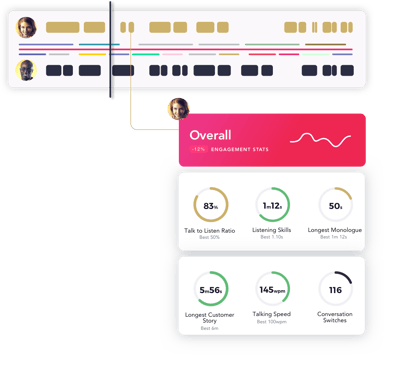
How does conversation intelligence work?
Conversation Intelligence platforms use advanced technologies and AI to record and analyze the voice of customer through conversation data and uncover areas for sales team improvement. For example:
- Does the sales rep ask enough questions?
- What pain points or objections does the prospect have?
- Or is the sales strategy followed?
Sales teams can take the sales call recording and receive insights and recommendations alongside the video timeline to understand what went well and what to look out for.
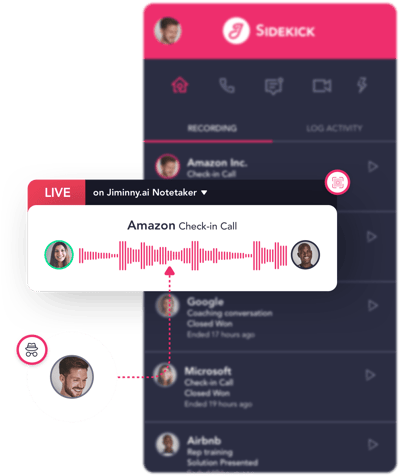
What is the purpose of conversation intelligence software?
Spot-checking calls can help, but it’s a time-intensive task to listen to multiple call recordings and identify where a deal went sideways.
In most cases, managers have multiple team members engaging in dozens of prospect interactions a day - the sheer volume is overwhelming. This is why conversation intelligence exists; to save leaders time in reviewing conversation data while providing total deal and performance visibility.
Where customer engagements are so central to a function, such as sales, leaders need this visibility and context to oversee and effectively mentor their team.
Conversation intelligence can be applied for numerous outcomes. For example, many CI tools provide automatic note-taking, so reps are provided with a comprehensive transcription and summary of a call after it has happened.
How does conversation intelligence benefit sale teams
Conversation intelligence provides sales leaders with a comprehensive view of their team's conversations. This allows them to identify best practices, improve objection-handling techniques, and optimize sales processes. By analyzing conversation data, sales teams can better understand market needs and customer pain points, and personalize their approach. This results in more effective interactions and increased revenue. Use cases include:
Alerting key individuals to stalled deals
Conversation intelligence tools are invaluable in identifying deals that are at risk of stalling. By analyzing conversation patterns and detecting early warning signs, such as a lack of engagement or repeated objections, CI can alert revenue leaders to intervene before it's too late.
With CI, teams can prioritize the deals that need the most attention, reallocating resources effectively to ensure that more deals close successfully and overall conversion rates improve.
Responding to individual conversation or objections raised by a prospect
Understanding what makes or breaks a deal is critical for continuous improvement. CI tools can isolate pivotal moments in conversations that lead to a deal being won or lost, allowing teams to learn from these outcomes. Sharing these insights across the team ensures that mistakes aren’t repeated, and successful strategies are replicated. Even dedicating a small amount of time each week to reviewing these key moments can significantly boost future sales performance.
Visualizing trends in words and phrases used by the sales team and customers
Conversation intelligence tools enable sales teams to visualize trends in the language used during conversations. By analyzing which words and phrases resonate with prospects or which ones turn them off, teams can fine-tune their messaging for maximum impact. This not only improves the customer experience but also increases the likelihood of conversion.
Improving new sales and renewal forecasts with data rather than intuition
Relying on intuition for sales forecasting is risky. Conversation intelligence provides hard data on the health of your pipeline, allowing for more accurate forecasts. When sales teams can forecast with confidence, it leads to more reliable business performance and better resource and strategy planning.
A recent study by Salesforce found just 45% of revenue leaders felt confidence in the accuracy of their sales forecasts. This reliability in forecasting is crucial for managing expectations and planning for growth.
Identifying coachable moments
Sales coaching is essential, but trawling through every call a rep has made to find the most coach-able moments just isn't a viable way to get it done. CI helps sales leaders identify coachable moments within specific deals or across general interactions. By pinpointing areas where reps can improve, CI ensures that coaching time is spent effectively and yields better results.
According to Sales Management Association, companies that have a formal coaching process in place experience 17% higher win rates. CI enhances this process by making it easier to focus coaching efforts where they’re needed most, ultimately boosting the effectiveness of your sales team.
Accelerating new sales onboarding and shortening ramp-up time
When new hires have quick and easy access to your business' best practice sales playbook, they can replicate expected behaviour much quicker and analyze their own performance in line with it.
Lemon.io reduced their onboarding time by 20% using Jiminny's conversation intelligence, and cut the time investment needed from hiring managers to onboard reps by 50%.
Spotting top performers and what they do differently
You might know who your top performers are, but understanding why they excel is often less clear. CI tools can analyze their conversations to reveal the subtle techniques and strategies that set them apart. This knowledge can then be shared with the rest of the team to elevate overall performance.
Harvard Business review found salespeople who engage in knowledge sharing within their team saw a 24% increase in their sales productivity. Your people are your most valuable asset so making the most of them and their expertise, whatever the size of your team, is crucial.
Encourage self-improvement efforts from the reps
CI empowers sales reps to take control of their own development. By giving them access to their conversation analytics, reps can identify their strengths and areas for improvement without waiting for feedback from a manager. This fosters a culture of continuous learning and self-improvement.
According to a survey by LinkedIn Learning, 94% of employees would stay at a company longer if it invested in their learning and development. CI tools support this by enabling reps to actively engage in their own growth, leading to higher job satisfaction and retention.
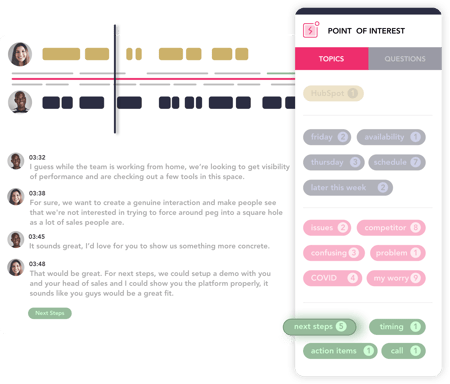
Conversation intelligence software can work in conjunction with sales call recording and revenue intelligence software to drive performance in revenue teams regardless of industry. New use-cases and benefits are found every day as users from new and emerging markets adopt CI into their workflow.
Beneficial integrations with other teams
Conversation intelligence isn’t only for sales teams. It empowers the entire organization with valuable customer insights that an be harnessed and actioned to improve your go-to-market and customer retention strategies. The insights provided make it easier to give customers what they really want and in the way they want. Here are a couple of examples:
- Marketing Teams can improve marketing messaging and presentations, by better aligning company language to that used by customers.
- Product Development Teams can better understand customer needs and pain points, making future product development more aligned to the market.
- Sales Enablement Teams can be more attuned to customer behaviours and buying preferences, making customer onboarding processes smoother.
- Customer Success Teams can be brought up to speed more quickly on the information customer have shared during the sales process, so the handover from Sales to CS is more efficient.
Applications and Jiminny’s Conversation Intelligence software specific features
There are many potential applications for conversation intelligence to improve customer experience and business operations. The benefits have been seen across industries and companies of different sizes. For example, Connectd grew their ARR by 11% and reduced their new rep onboarding and ramp time from two months to less than one month.
Research has found a correlation between sales teams that use conversation intelligence and improved sales outcomes, which explains why many businesses are implementing conversation intelligence platforms into their workflow.
Here are some key use cases and features of Jiminny's Conversation Intelligence:
- Sentiment analysis - Automatically detect customer sentiment (positive, negative, neutral) in conversations to understand satisfaction.
- Intent analysis - Identify customer goals and intent, like making a purchase, complaint or information request.
- Topic extraction - Uncover common topics in customer conversations to identify pain points.
- Rep performance - Evaluate your sales reps based on metrics like customer sentiment or resolution rate.
- Call transcription - Real-time voice-to-text transcription for phone calls.
- Automatic Call Scoring - Have conversations automatically analyzed and scored based on your best practice rulebook, so issues are highlighted to you in an instant.
- Reporting and analytics dashboard - Visualize key conversation metrics and trends.
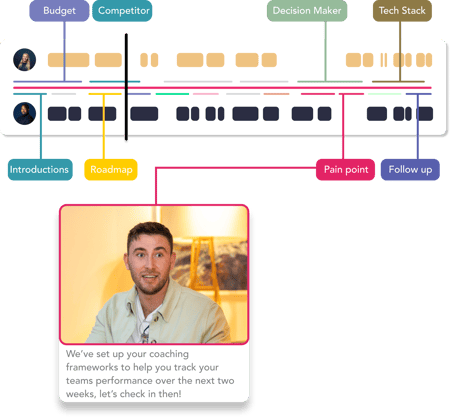
How do you use conversation intelligence tools at work?
For the most part, conversation intelligence software syncs into your existing workflow - the aim is to support you and make your job easier, not to add another task to your to do list.
Many CI tools join customer calls and meetings as a 'participant', which allows the conversation data to be recorded. Users can then log into their CI platform to view the recording, transcription and analysis and use the insights as required.
In addition to integrating into call dialers (such as RingCentral, CloudCall and AirCall), CI tools can integrate into a variety of business tools, such as CRMs (including SalesForce and Hubspot) and calendars (such as Google Calendar and Microsoft Office 365 Calendar).
Conversation Intelligence at work: Cision, a Jiminny customer
Cision, a leading provider of media software, lacked sales visibility. Sales Managers Mike Day and Luke O’Connor struggled to identify team strengths and weaknesses. Without this insight, building an effective coaching culture seemed impossible.
After partnering with Jiminny, Mike and Luke gained visibility into sales conversations. Now they easily pinpoint coaching opportunities without tedious call reviews. Jiminny's visibility empowered Mike and Luke to develop a structured coaching strategy, so they can provide feedback based on data-driven insights from Jiminny.
The results? A 20% increase in average order value so far. Call quality has improved as reps pitch higher-value products more often. According to Mike, reps' discovery skills are sharper after coaching as they dig deeper to understand prospect needs and become trusted advisors.Beyond revenue growth, win rates have increased thanks to insightful coaching. As Luke stated, “Jiminny has been a game changer.” For sales leaders lacking visibility, it delivers data-driven coaching for efficiency and revenue gains.
You can read more about Jiminny's conversation intelligence at work in our case studies here.
Conversation Intelligence and sales coaching
Conversation intelligence has a significant impact on sales coaching.
By analyzing all recorded sales calls, sales leaders can spotlight the calls that require the most coaching. Whether leaders are looking to learn from mistakes or recognize best practices in action, it makes more efficient use of their coaching time.
Managers can provide targeted feedback, share best practices, and offer personalized coaching to enhance the performance of each sales team member.
It also supports monitoring the impact of coaching over time, to assess metrics such as adherence to sales methodologies, talk time or question rate. Coaches can select KPIs with their reps, focusing on the areas they need to improve, then create coaching plans to progress in those areas.
Finally, self-coaching is not just feasible but incredible accessible to reps with conversation intelligence tools. Reps will know where they need to improve instantaneously after a call, thanks to sales call scoring, so they can improve their performance as much as they want.

Elevate every conversation: Embrace the power of conversation intelligence
Conversation intelligence is more than a nice to have in today’s competitive sales landscape, providing visibility, quality assurance and optimizing a team’s time with a view to coaching, learning, and improving. To find out more about the use cases for conversation intelligence, click here.
As a transformative technology, it’s a game-changer for sales teams striving to excel in today's competitive landscape. By embracing conversation intelligence, you're not only unlocking invaluable insights from every customer interaction but also empowering your team to navigate sales calls with confidence and finesse.
From onboarding new reps faster to driving productivity and enhancing coaching efforts, the benefits are undeniable.
Tom Lavery is the CEO and Co-Founder of Jiminny, the leading conversation intelligence and sales coaching platform that helps companies maximize their revenue. With over 15 years of experience in high-growth VC/PE-backed SaaS companies, Tom was previously SVP at Reward Gateway, now sharing his wealth of knowledge as a speaker in the conversation intelligence space.
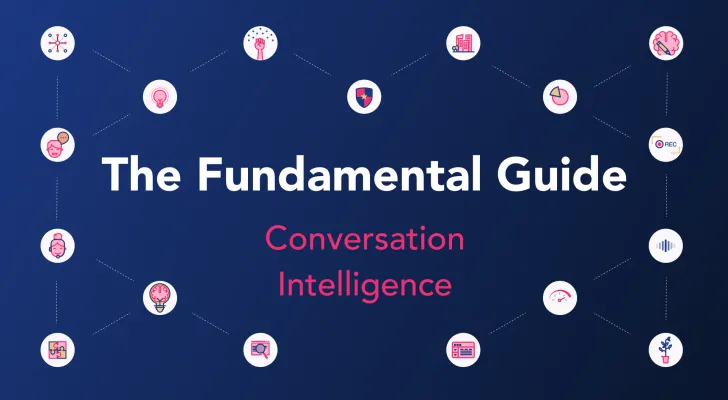




.webp)






